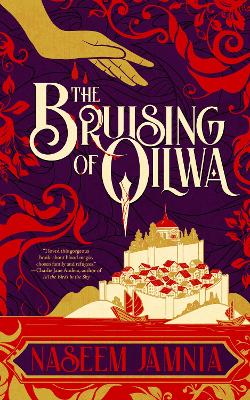Firuz-jan, you cannot appreciate the dangers a tool possesses unless you are hurt by it. Only then can you learn how to use it properly to prevent such pain. How else can we promise the world we pose no threat?
Thank you NetGalley for the chance to read and review The Bruising of Qilwa by Naseem Jamnia.
Naseem Jamnia is an editor at Sword & Kettle Press, which is a small press of feminist speculative fiction and poetry. They also have some chapbooks which I’m interested in (in case anyone wants to get me something for no reason or as an early birthday present). While they have published some short stories, The Bruising of Qilwa is their debut.
The Bruising of Qilwa is being published by Tachyon Publications (they published the tangleroot palace which is just love) on the 9th of August. At just under 200 pages (191) it’s classified as a novella.
Our main charter Firuz is a practitioner of blood magic who does their best to hide it as they arrived in Qilwa with their family. Living in the slums, Firuz (who has some medical training) starts work as a clinic with Kofi training them, as the city is threatened by a pandemic blamed on the refugees. As the illness changes it’s nature, Firuz has to do their best to find out how to stop an illness spread by someone adept in blood magic.
There are a lot of themes that stand our in this little book. For those interested in found family, this will be a nuanced fantasy that covers the love, the worry and the hurt of those relationships. For those interested in magic, the details on balance will stand out. For those interested in migration and encounters between communities at the frontier, the relationship between Sassanians and Dilmunis will be fascinating (especially after Kofi’s small lesson).
It would also be amiss to not comment on how The Bruising of Qilwa is also an incredibly queer read. Our main character and their brother is trans, everyone is introduced with their pronouns at the start, and the author also makes use of neopronouns (hu and ey) in the book. I’m sorry to say that I’m not used to that in books, and was sure that hos was a type, until I got to hu and realised that this was another pronoun. Firuz also uses they/them pronouns and is asexual (I think).
Firuz is also a great character to read about. They’re doing their best to juggle the demands of work and end up neglecting their younger brother. They feel incredibly guilty for having managed to get a home outside of the slums, and they aren’t incredibly powerful themselves.
But you don’t know what it was like to go through that training… You have no idea what it’s like to be a blood magic user by affinity. No clue what our culture does and doesn’t condone.
I will say that I found the ending too rushed. I would have wanted more with Kofi, more hints of everything that was to come. I think that could have been elaborated on instead of just happening like that. The history lesson with Sassanians and Dilmunis was great, but I didn’t feel like any of that was properly explored in the story and it felt like it was just thrown in.
To sum, this was a 4 out of 5 star read, and I hope to see more from Naseem Jamnia in the future!
